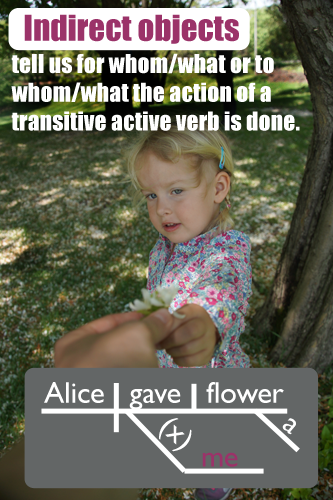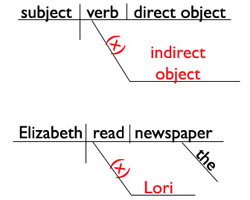Download your free grammar guide here.
Download your free grammar guide here.
What is an indirect object?
What is an indirect object?
- Home
- Parts of Speech
- Nouns
- Indirect Objects
Are you ready to learn about indirect objects (IOs)? Great! If you haven't read the lesson on direct objects (DOs) yet, you'll probably want to do that before reading on.
Quick Refresher
- Direct objects complete the meaning of certain action verbs. Direct objects are directly affected by the action of the verb.
The boy kicked the ball.
Alice poured me lemonade.
- To find the direct object, ask the following question.
What/Whom did the (subject) (verb)?

Indirect objects are nouns (or pronouns) that tell us for whom/what or to whom/what the action of the verb is done.
They are indirectly affected by the action of the verb.
The boy kicked Lori the ball.
Alice poured me lemonade.
Lori is an IO. It is receiving the direct object (ball).
Me is an IO. It is receiving the direct object (lemonade).
In order for a sentence to have an IO, it MUST have a DO (direct object).
To find the indirect object, ask the following question.
(Subject) (verb) the (direct object) to whom/for whom?
When we fill in the blanks for our example sentences above, our question becomes...
The boy kicked the ball to whom?
Alice poured the lemonade for whom?
The answers are Lori and me. Lori and me are IOs.
"Missing" Prepositions
Look at these two sentences.
1. Alice gave me a flower.
2. Alice gave a flower to me.
Those sentences give us the same information, but the second one uses a preposition (to) and the first one does not.
Sentences with IOs tell us TO whom/what or FOR whom/what something is done, but they don't contain the words to or for. It's as though these sentences contain "missing" prepositions.
Prepositional Phrases
The boy kicked the ball to Lori.
Alice poured lemonade for me.
I sang a song for my grandma.
To Lori, for me and for my grandma are prepositional phrases.
Lori, me, and grandma are objects of the prepositions.
Indirect Objects
The boy kicked Lori the ball.
Alice poured me lemonade.
I sang my grandma a song.
Lori, me, and grandma are IOs.
Sentence Diagramming & Indirect Objects
IOs are diagrammed underneath the verb just like a prepositional phrase without the preposition.
Place an (x) in the place where the preposition would normally go.

Elizabeth read Lori the newspaper.
It's your turn!
(Subject) (verb) the (direct object) for whom/to whom?
Directions: Find the verbs, the DOs, and the IOs in the following sentences.
1. I gave my friend a bouquet of flowers.
2. Jeremy and Sara brought the hostess delicious chocolates.
3. Olivia's music teacher lent her a recording of Tchaikovsky's The Nutcracker Suite.
4. My sister-in-law sent us photos of the wedding.
5. The teacher handed her student the assignment.
6. We wish you a merry Christmas and a happy New Year.
Answers
The transitive active verbs are in bold, the direct objects are underlined, and the IOs are in red.
1. I gave my friend a bouquet of flowers.
2. Jeremy and Sara brought the hostess delicious chocolates.
3. Olivia's music teacher lent her a recording of Tchaikovsky's The Nutcracker Suite.
4. My sister-in-law sent us photos of the wedding.
5. The teacher handed her student the assignment.
6. We wish you a merry Christmas and a happy New Year.
If you'd like to teach or learn grammar the easy way—with sentence diagrams—check out our Get Smart Grammar Program.
It starts from the very beginning and teaches you grammar and sentence diagramming in easy, bite-size lessons.

Hello! I'm Elizabeth O'Brien, and my goal is to get you jazzed about grammar.
My freshman class has excelled using your method!
- Chuck, Classroom Teacher
This is original content from https://www.english-grammar-revolution.com/indirect-object.html
Our Free Guide Gives You A Fun Way
To Teach And Learn The Basics v

Elizabeth O'Brien is the creator of Grammar Revolution.
Her lessons are guaranteed to give you more confidence in your communication skills and make you smile. :)

